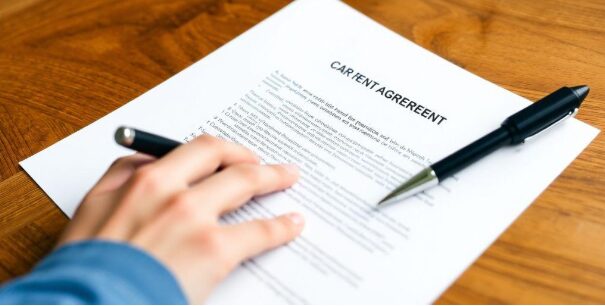- Read The Rental Agreement
Okay, so you’re about to grab the keys and hit the road, right? Hold up a sec! Before you peel out of the rental lot, you absolutely, positively need to read that rental agreement for your self drive car rental. I know, I know, it’s boring. But trust me, it can save you a ton of headaches (and money) later on. Think of it like this: it’s a contract. And you wouldn’t sign a contract without reading it, would you? This agreement spells out everything – what you’re responsible for, what the rental company is responsible for, and what happens if things go sideways.
- Don’t skim it! Actually read each section.
- Pay close attention to the fine print about insurance.
- Make sure you understand the fuel policy. Nobody wants surprise charges!
I remember this one time, I didn’t read the agreement closely enough and ended up paying extra because I didn’t fill the gas tank all the way up. It was way more expensive than just stopping at a gas station before returning the car. Lesson learned!
It’s also a good idea to ask the rental agent to clarify anything you don’t understand. Seriously, don’t be shy. It’s their job to explain it to you. Once you’re clear on all the terms, you can sign with confidence and enjoy your trip without worrying about hidden fees or unexpected surprises.
- Inspect The Car
Okay, so you’ve got the keys in hand, ready to roll. But hold up! Don’t just jump in and drive off. Taking a few minutes to really look over the car can save you a ton of headaches later. Trust me, it’s worth it.
First things first, walk around the entire car. I mean, really look at it. Check for any scratches, dents, or anything that looks off. It’s super easy to miss something small, especially if you’re excited to get going, but those little things can end up costing you big time if they aren’t documented beforehand.
- Document everything. Use your phone to take pictures or videos of any existing damage. Make sure the date and time are visible in the photos. This is your proof that the damage was already there when you picked up the car.
- Check the tires. Are they properly inflated? Do they have enough tread? Low tire pressure can affect handling and fuel economy, and worn tires are just plain dangerous.
- Look at the windshield. Any cracks or chips? Even small ones can spread and become a bigger problem.
It’s happened to me before. I didn’t notice a tiny scratch on the bumper when I picked up a rental, and guess who got charged for it when I returned the car? Yep, me. Now I’m super careful about inspecting everything.
Next, get inside the car. Turn on the headlights, brake lights, turn signals, and windshield wipers to make sure they’re all working. Check the mirrors, adjust the seats, and familiarize yourself with the controls. You don’t want to be fumbling around trying to figure out how to turn on the headlights while you’re driving at night.
- Test the AC and heater. You want to make sure they’re working properly, especially if you’re driving in extreme weather.
- Check the fuel level. Make sure it matches what’s stated in the rental agreement. If it doesn’t, let the rental company know right away.
- Look for the spare tire and jack. Hopefully, you won’t need them, but it’s good to know they’re there and in good condition.
Finally, before you leave the rental lot, make sure that any existing damage is noted on your rental agreement. If it’s not, insist that it be added. Get a copy of the updated agreement for your records. It’s better to be safe than sorry!
- Secure Your Data
Okay, so you’re all set to hit the road, but before you do, let’s talk about something super important: keeping your personal information safe. It’s easy to overlook this when you’re excited about a trip, but trust me, it’s worth taking a few extra steps to protect yourself.
- Only share what’s absolutely necessary. Rental companies will need some info, but don’t overshare. Think twice before handing over copies of your passport or other sensitive documents unless they’re really required.
- Use strong, unique passwords for any online accounts you use to book or manage your rental. It’s a pain, I know, but it’s a good habit to get into.
- Be careful about using public Wi-Fi. It’s convenient, but it’s not always secure. If you need to access sensitive information, consider using a VPN.
It’s a good idea to clear any personal data from the car’s infotainment system before you return it. Things like your phone’s Bluetooth connection, saved addresses, and navigation history can all reveal information about you. A few minutes of cleaning up can save you a lot of potential headaches.
- Pay with a credit card. Credit cards usually offer better protection against fraud than debit cards or cash.
- If a deal seems too good to be true, it probably is. Be wary of scams and always book through reputable rental companies.
- Keep an eye on your bank statements after the rental period to make sure there aren’t any unexpected charges.
- Understand The Rental Policies
Okay, so you’re about to grab the keys and hit the road. Awesome! But before you do, let’s talk rental policies. This isn’t the most exciting part, I know, but trust me, it can save you a ton of headaches (and money) later on. Different companies have different rules, and even within the same company, policies can vary depending on location and the type of car you’re renting. So, pay attention!
First things first, read the fine print. I know, it’s tempting to skip it, but that rental agreement is your bible for this trip. It outlines everything from what happens if you get a flat tire to what kind of insurance you have (or don’t have).
Here’s a few things to keep in mind:
- Fuel Policy: Do you need to return the car with a full tank? What happens if you don’t? Some companies will charge you an arm and a leg to fill it up themselves.
- Mileage Limits: Is there a limit to how many miles you can drive? If so, what’s the overage fee? This is super important if you’re planning a long road trip.
- Insurance Coverage: What kind of insurance is included in the rental price? Do you need to purchase additional coverage? It’s worth checking your own car insurance policy and credit card benefits to see if you’re already covered.
It’s always better to be safe than sorry. Take the time to understand the rental policies before you drive off the lot. It could save you a lot of money and stress in the long run.
And hey, if you have any questions, don’t be afraid to ask the rental agent. That’s what they’re there for!
- Check The Vehicle Condition
Okay, so you’ve got the keys in hand, ready to roll. But hold up! Before you peel out of the rental lot, take a good, hard look at the car. This isn’t just about kicking the tires; it’s about saving yourself from potential headaches (and charges) later on. Trust me, a few minutes of inspection now can save you a ton of grief.
- Walk around the entire car. Seriously, all the way around.
- Look for any scratches, dents, or dings. Even small ones.
- Check the windshield for cracks or chips.
It’s super important to document everything. Use your phone to take pictures or videos of any existing damage. Make sure the date and time are visible in the photos. Then, point out the damage to the rental company representative and have them note it on your rental agreement. This way, they can’t try to pin it on you when you return the car.
Don’t forget the inside! Give the interior a quick once-over too.
- Check the seats for stains or tears.
- Make sure all the lights work (headlights, taillights, brake lights, turn signals).
- Test the windshield wipers and the horn.
Basically, you want to make sure everything is in working order before you leave. If you find anything that concerns you, bring it to the attention of the rental company right away. It’s better to be safe than sorry!
- Know The Local Traffic Laws
Okay, so you’ve got the car, you’re ready to roll, but hold up! Before you even think about turning the key, you absolutely need to get familiar with the local traffic laws. Seriously, this isn’t something you can skip. Different places have different rules, and ignorance isn’t an excuse when you’re slapped with a hefty fine or, worse, involved in an accident.
- Speed Limits: These aren’t just suggestions. Pay attention to the posted limits, because speed cameras are everywhere, and they’re not forgiving. What’s considered a normal speed back home might be way over the limit here.
- Right-of-Way Rules: Roundabouts, intersections, unmarked roads – they all have their own unspoken rules. Watch how the locals do it for a bit, and if you’re unsure, yield. It’s better to be safe than sorry.
- Parking Regulations: Don’t just assume you can park anywhere. Look for signs, check for colored curbs, and be aware of time restrictions. A parking ticket is a real buzzkill.
It’s a good idea to spend a little time before your trip researching the specific traffic laws of the area you’ll be driving in. Many countries and states have websites or apps that provide this information. A little preparation can save you a lot of headaches (and money) down the road.
- Seat Belt Laws: In most places, seat belts are mandatory for everyone in the car, not just the driver. Make sure everyone buckles up before you start driving.
- Mobile Phone Use: Many places have strict laws about using your phone while driving. Hands-free is usually okay, but texting or holding the phone to your ear is a big no-no.
- Drinking and Driving: This should be obvious, but don’t even think about drinking and driving. The penalties are severe, and it’s just not worth the risk.
- Book Early, Especially During Peak Times
Okay, so you’re planning a trip and thinking about renting a car? Smart move! But here’s a little secret: don’t wait until the last minute, especially if you’re traveling during a busy time. Trust me on this one.
Think about it – everyone else is probably having the same idea. Booking early ensures you actually get a car, and not just any car, but the right car for your needs. Plus, you’ll likely snag a better deal. Rental companies often hike up prices as their inventory dwindles.
- Holidays (think Thanksgiving, Christmas, etc.)
- School breaks (spring break, summer vacation)
- Major events (conferences, festivals, sporting events)
I learned this the hard way a few years ago. Tried to book a car for a family trip during spring break, and everything was either sold out or ridiculously expensive. Ended up paying way more than I should have, and we were stuck with a tiny car that barely fit our luggage. Not fun.
So, do yourself a favor and book that rental car well in advance. Your wallet (and your sanity) will thank you.
- Pick The Right Car For Your Adventure
Choosing the right car is super important when you’re renting a car for self drive. It’s not just about getting from point A to point B; it’s about making sure you’re comfortable, safe, and have enough space for everyone and everything. Think about where you’re going and what you’ll be doing. A tiny car might be great for zipping around a city, but it’s not going to cut it if you’re planning on hitting some rough roads or need to haul a bunch of gear.
The type of vehicle you select should align with your travel requirements.
Consider these points:
- Location: City driving vs. off-road adventures require different vehicles.
- Passengers: Make sure there’s enough space for everyone to sit comfortably.
- Luggage: Don’t forget about your bags! A compact car might not be ideal if you’re bringing a lot of stuff.
- Features: Do you need GPS, Bluetooth, or other specific features?
Renting a car for self drive is all about freedom, but that freedom is only as good as the car you’re in. Take the time to pick the right one, and you’ll have a much better trip. I remember one time I rented a tiny car for a road trip with friends, and it was a total disaster. We were cramped, uncomfortable, and had no room for our luggage. Lesson learned!
- Scrutinize The Car For Damage
Okay, so you’ve got the keys in hand, ready to roll. But hold up! This is super important: before you even think about putting the car in drive, give it a really good once-over. I mean, really good. Don’t just glance at it; get up close and personal. This could save you a ton of headaches (and money) later on.
Think of it like this: you’re protecting yourself. Rental companies can sometimes try to pin existing damage on you when you return the car, so you need to make sure you’re covered.
Here’s what I usually do:
- Walk around the entire car: Look for scratches, dents, dings, anything out of the ordinary. Even small things can add up.
- Check the windshield and windows: Look for cracks or chips. These can be safety hazards, too.
- Inspect the tires: Make sure they have enough tread and no visible damage.
- Take photos or videos: Document everything you find. This is your proof if there are any disputes later.
It’s always better to be safe than sorry. I once skipped this step and ended up paying for a scratch that was already there. Lesson learned!
Don’t be shy about pointing out any damage to the rental company representative before you leave the lot. Make sure they note it on your rental agreement. If they don’t, insist that they do. It’s your right to have an accurate record of the car’s condition before you take it.
It might seem like a hassle, but trust me, taking a few extra minutes to scrutinize the car for damage is totally worth it. It could save you a lot of money and stress in the long run.
- Return On Time
Okay, so you’ve had your adventure, seen the sights, and now it’s time to bring the rental car back. This last step is super important, and it’s all about timing. Returning the car late can lead to some pretty hefty extra charges, so it’s best to avoid that if you can.
Think of it like this: the rental company has a schedule, and if you mess with it, they’re going to charge you for the inconvenience. It’s not just about being a few minutes late; sometimes, even an hour can trigger an extra day’s rental fee. Nobody wants that surprise on their bill!
Here are a few things to keep in mind to make sure you’re on time:
- Know Your Deadline: Double-check your rental agreement for the exact return time. Set a reminder on your phone, maybe even two, just to be safe.
- Factor in Traffic: Give yourself plenty of time to get back to the rental location, especially if you’re returning the car during rush hour. Traffic jams can happen, and you don’t want to be stuck in one, watching the clock tick.
- Account for the Return Process: Returning the car isn’t always as simple as pulling up and dropping off the keys. There might be a line, or the attendant might need to inspect the car. Plan for these potential delays.
If you think you might be late, call the rental company ASAP. Sometimes, they’re understanding, especially if you have a good reason. It’s always better to communicate than to just show up late and hope for the best.
And hey, while you’re at it, make sure you’ve got all your belongings out of the car. Check under the seats, in the glove compartment, and in the trunk. It’s easy to forget something, and it’s a pain to have to go back for it later. Returning the car on time and empty is the perfect way to end your rental experience!
Getting your car back on time is super important. It helps keep everything running smoothly and makes sure you don’t get extra charges. If you want to learn more about our rental policies and how to avoid late fees, check out our website for all the details!
Wrapping It Up
Renting a car can really change the way you explore a new place. By keeping these tips in mind, you can avoid a lot of headaches and enjoy your trip more. Make sure to read the rental agreement, check the car for any damage, and know the local rules. Don’t forget to plan your routes and return the car on time. With a little preparation, you’ll be cruising around with confidence and making the most of your adventure. So, get ready to hit the road and have a great time!
Frequently Asked Questions
What should I check before taking the rental car?
Before you drive away, make sure to check the car for any scratches, dents, or other damages. Take pictures of any issues and report them to the rental company.
How can I protect my personal information when renting a car?
Only share the necessary personal and payment information. Avoid giving sensitive data like your passport or credit card details through unsecured channels.
What happens if I return the car late?
If you return the car later than the agreed time, you may have to pay extra fees. Always try to return it on schedule to avoid any penalties.



































